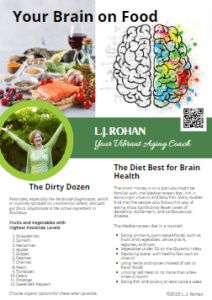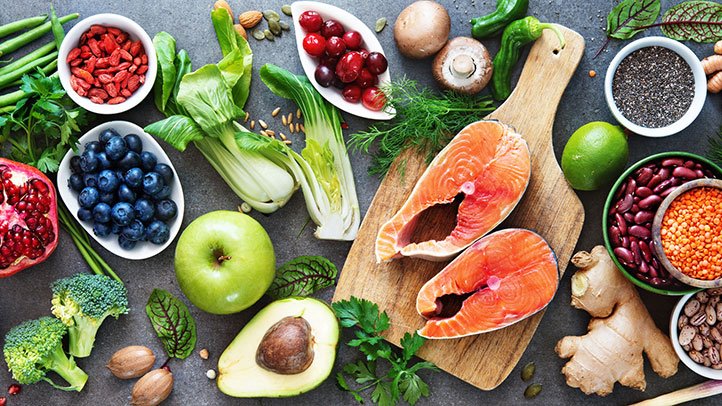Today, I start with the bad news and end with the good news. We know that the food we eat matter to our brain health. The latest research tells us that the underlying causes of Alzheimer’s disease begin with having too much sugar on the brain. The average American eats 22 teaspoons of sugar a day; over the course of a year, that’s 152 lbs. of sugar. The American Heart Association says we should aim for a maximum of 6 teaspoons a day. The higher your blood sugar, the smaller your brain. Too much sugar in the brain actually makes the brain shrink.
We also eat 146 lbs. of flour a year. Pesticides, especially the herbicide Glyphosate, which is routinely sprayed on commercial wheat, disrupts gut flora. (Glyphosate is the active ingredient in Roundup.)
Sadly, farmers have a much higher risk of dementia than the average person because of their exposure to pesticides. Andrew Weil, MD, was one of the first experts in nutrition to identify what he calls “The Dirty Dozen.” These are most heavily sprayed fruits and veggies, and so they register the highest levels of pesticides inside them.
Fruits and Vegetables With Highest Pesticide Levels
Here is the list, in order, of the “Dirtiest” fruits and vegetables first:
- Strawberries
- Spinach
- Nectarines
- Apples
- Grapes
- Peaches
- Cherries
- Pears
- Tomatoes
- Celery
- Potatoes
- Sweet Bell Peppers
Every smart nutrition expert recommends choosing organic for as much of our produce as possible, and especially opting for organic when it comes to eating any of these top offenders. I printed out this list and keep it taped to my kitchen cabinet (where all important notes live at my house), to remind me what to buy before I go to the grocery store. I also keep a small printed and laminated version in my wallet for handy reference. (I know that sounds a bit obsessive, but, I love my brain!)
Now for the Good News!
Our body ranks as one of the most incredibly powerful compositions of cells and fluids in the universe, and it can and will heal itself when we feed it good things. All is not lost, no matter at what age we re-choose what we put in our mouths.
The Diet Best For Brain Health
The smart money is on a plan you might be familiar with, the Mediterranean diet.
This plan isn’t a “diet,” like ones that continue to make headlines: “Lose 20 Pounds in 20 Minutes by Eating Crabgrass,” or other crazy diets that fill magazine pages and bookseller’s tables. This plan is a way of eating for life.
The newest research says a diet higher in fat is better for brain health, making the Mediterranean diet an excellent choice for body, gut, and brain health. It’s rich in extra virgin olive oil and fatty fish. Many studies find that the people who follow this way of eating show significantly fewer cases of dementia, Alzheimer’s, and cardiovascular disease.
In his best-selling book, The Blue Zones, author Dan Buettner listed the world’s healthiest and longest living people on the planet. What way of eating has each culture followed? Either the Mediterranean diet itself, or a very close cousin to it.
The Mediterranean diet in a nutshell:
- Eating primarily plant-based foods, such as fruits and vegetables, whole grains, legumes, and nuts
- Replacing butter with healthy fats such as olive oil
- Using herbs and spices instead of salt to flavor foods
- Limiting red meat to no more than a few times a month
- Eating fish and poultry at least twice a week
To this, Mark Hyman MD suggests eating foods higher in fat such as avocados, and/or adding avocado oil or coconut oil to your daily diet. At every meal fill two-thirds of your plate with veggies—focusing on veggies found below a score of 50 on The Glycemic Index. Look online for this life-saving chart. (Yes, I have a copy of this on my cabinet and in my wallet, as well.)
Eating what Dr. Hyman and others call “smart carbs,” low glycemic carbs won’t raise blood sugar. This way of eating benefits both your gut and brain. Your gut flora will come into balance, which will boost your immune system, and slow down the aging process. A double-dip of positive effects!
Plus, following this diet will protect your brain from stress and its devastating effects on cognitive function and memory. It will also help you lose weight. A triple-play home run to my way of thinking.
Choosing healthy fats vs. empty carbs to fuel the body is the way to go. A recent study from the Mayo Clinic in the Journal of Alzheimer’s Disease, found that people who ate higher fat sources for calories had a 44% reduction in risk of dementia as opposed to an 86% increased risk of dementia by those who ate a more traditionally American diet of refined carbohydrates.
Add to that a rainbow of organic veggies at each meal, meat as a rare treat, and plenty of high-quality filtered water and you could live a long and healthy life just like the folks in Dan Buettner’s study.
Until next time…Be Vibrant!
Download a Printable PDF
Print this free PDF and hang it on your fridge so that you always have this science-based information available!


L.J. Rohan is a Gerontologist (University of Southern California’s Davis School of Gerontology), Certified Aging in Place Specialist (CAPS), and Vibrant Aging™ Coach. L.J. is dedicated to redefining the aging process. With a focus on holistic well-being, she combines scientific research and practical insights to guide women age 55+ towards a vibrant, fulfilling life. Her work has been featured in numerous publications and she frequently speaks at institutions such as Yale University and Southern Methodis University. Be Vibrant!





2 thoughts on “Your Brain on Food”
Hello, is it possible I could print this to add to my reference file. I would love to refer back to it often for my own use.
Excellent question! You can download a printable PDF here: https://www.ljrohan.com/product/download-your-brain-on-food/